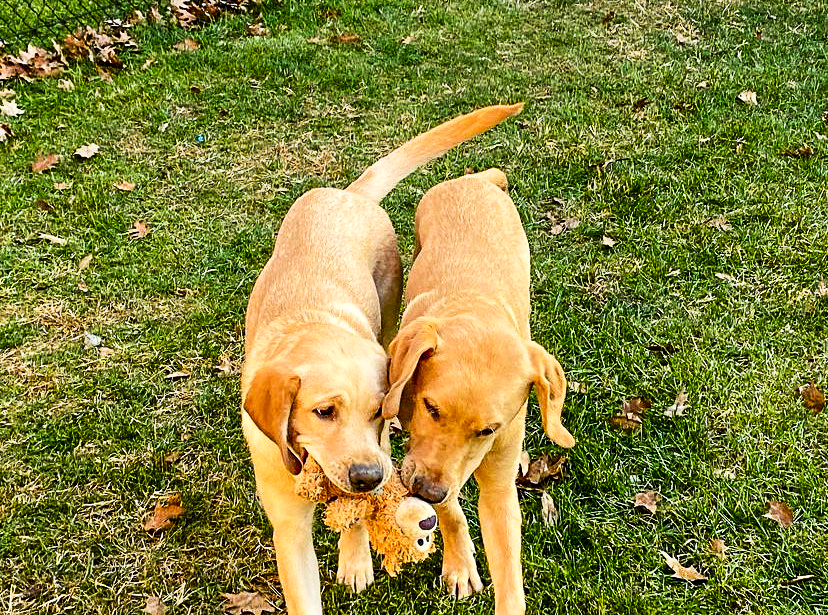The dog days are over – or maybe just beginning – for residents of the Dog House, who welcomed two new service dogs-in-training to campus last month.
The newest additions to the Monroe Street residence are Tyler and Coogan: six-month-old golden lab mixes. The puppies are on campus as part of a partnership with Canine Partners for Life, whose “Community Puppy Raise Program” connects volunteers with future service dogs to teach basic obedience commands and comfortability in different public spaces.
In anticipation of the dogs’ arrival, Dog House residents participated in Canine Partners’ training to learn how to best acclimate the puppies to their new campus environment.
“A lot of it is mental preparation. You have to mentally be ready for a lot of hard work,” Dog House resident Urvi Thakker ‘26 said. “These are still puppies. They’re still figuring out the world.”
This year’s dogs are excellent students.
“[Coogan] is the sweetest boy,” Thakker said. “He’s so nice. He’s really playful and he’s also really disciplined, surprisingly for his age.”
Coogan recently overcame a fear of stairs, a milestone in his training thus far.
“We of course did not want to force him to go up the stairs so we talked through: what are possible ways that we could teach him to do this?” Bianca Falbo, the Dog House’s advisor and a certified dog trainer, said. “Eventually, he went up the stairs and everybody was really excited. Of course, there’s positive reinforcement for [the students] too because their hard work paid off.”
The dogs accompany the Dog House students to class, on walks on the Quad and trips to the grocery store in order to acclimate them to different environments. While Coogan and Tyler are friendly dogs, they are “working” during this time and cannot be purposefully distracted.
“It is difficult to tell people, ‘Hey, he is at work right now. I’m sorry but you can’t pet him,’” Thakker said of Coogan. “A huge part of the Dog House program is educating people about service dogs and having more of a conscience about that on campus … you can’t pet them, but it’s for a reason and that has to be respected.”
In addition to learning basic commands and socialization skills, the dogs are required to retrain some of their instincts such as sniffing unfamiliar objects.
“We basically have to say to these baby dogs, ‘No, you cannot sniff around, I’m going to take you into a grocery store, which is full of interesting smells and you can’t sniff.’” Falbo said. “If we’re going to do it, what’s the most ethical way to do it?”
The need to rewire the dogs’ innate behaviors has led to conversations within the program as to how to train the dogs in a way that is comfortable for them.
“Whenever we get together for training, we’re always talking about why we’re doing it and how we’re doing it,” Falbo said. “The students learned to be really sensitive to dog body language. How are the dogs processing it? If you do have them out … and you walk in and they’re completely overwhelmed, maybe you want to turn around and come back a different day.”
Coogan and Tyler’s needs come first for the Dog House residents.
“The first priority has to be the animals’ welfare,” Falbo said. “If it’s a morning when you get up and your dog is sick and you have class, you may well have to call your professor and say ‘I can’t make it.’”
Training a service dog while managing class and schoolwork can also be overwhelming for the trainer, according to Falbo. In the Dog House, residents support each other.
“If I have to stay at the Art Studio late one day, then one of my roommates will cover for me,” Thakker said. “If someone has an assignment that they have to do, then I’ll keep the dog that day. It’s a good community for us to lean on each other.”




















































































































